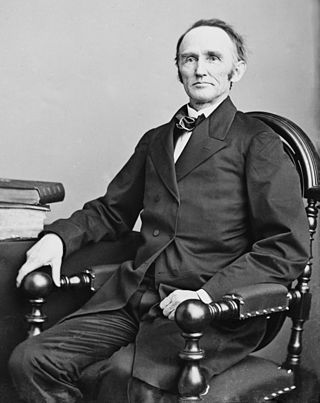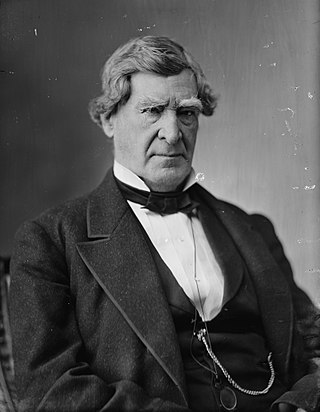Related Research Articles

Montgomery Blair was an American politician and lawyer from Maryland. He served in the Lincoln administration cabinet as Postmaster-General from 1861 to 1864, during the Civil War. He was the son of Francis Preston Blair, elder brother of Francis Preston Blair Jr. and cousin of B. Gratz Brown.

Jeremiah Sullivan Black was an American statesman and lawyer. He served as a justice on the Supreme Court of Pennsylvania (1851–1857) and as the Court's Chief Justice (1851–1854). He also served in the Cabinet of President James Buchanan, first as Attorney General (1857–1860), and then Secretary of State (1860–1861).

Nathaniel Lyon was a United States Army officer who was the first Union general to be killed in the American Civil War. He is noted for his actions in Missouri in 1861, at the beginning of the conflict, to forestall secret secessionist plans of the governor Claiborne Jackson.

Francis Preston Blair Jr. was a United States Senator, a United States Congressman and a Union Army major general during the American Civil War. He represented Missouri in both the House of Representatives and the Senate, and was active in preventing the State of Missouri from being absorbed into the Confederacy at the beginning of the war.

Timothy Guy Phelps was an American politician, businessman, and government official. He was the first president of the Southern Pacific Railroad from 1865 until 1868 and saw the railroad build its first tracks south of San Francisco, California.

Roger Atkinson Pryor was an American newspaper editor and politician who became known for his fiery oratory in favor of secession from the United States; he was elected both to national and Confederate office, and served as a general for the Confederate Army during the American Civil War. In 1865 he moved to New York City to remake his life, and in 1868 brought his family north. He was among a number of influential southerners in the North who became known as "Confederate carpetbaggers."

The Battle of Carthage, also known as the Engagement near Carthage, took place at the beginning of the American Civil War on July 5, 1861, near Carthage, Missouri. The experienced Colonel Franz Sigel commanded 1,100 Federal soldiers intent on keeping Missouri within the Union. The Missouri State Guard was commanded by Governor Claiborne F. Jackson himself and numbered over 4,000 soldiers led by a hero of Mexico, Sterling Price, along with 2,000 unarmed troops who did not participate in the battle.

The California State Capitol is the seat of the California state government, located in Sacramento, the state capital of California. The building houses the chambers of the California State Legislature, made up of the Assembly and the Senate, along with the office of the governor of California. The Neoclassical structure, designed by Reuben S. Clark, was completed between 1861 and 1874. Located at the west end of Capitol Park and the east end of the Capitol Mall, the building was added to the National Register of Historic Places in 1973. The California State Capitol Museum is housed on the grounds of the capitol.

Silas Woodruff Sanderson was the seventh Chief Justice of California.

Gilbert Moxley Sorrel was a staff officer and brigadier general in the Provisional Army of the Confederate States.
Hoopa is an unincorporated community and census-designated place (CDP) in Humboldt County, California. It is located 10 miles (16 km) south of Weitchpec, at an elevation of 328 feet (100 m). The ZIP Code is 95546.

Charles Lawrence Robinson was an American politician who served in the California State Assembly from 1851 to 1852, and later as the first Governor of Kansas from 1861 until 1863. Throughout his political career, he was a member of the Whig, Republican, and Democratic parties. He was also the first governor of a US state to be impeached by a state legislature, although he was found not guilty during a subsequent State Senate impeachment trial and was not removed from office. After his time as governor he served in the Kansas Senate from 1873 to 1881. He ran again for governor in 1890 but was unsuccessful in his attempt. To date, he is the only governor of Kansas to be impeached.
Rancho Salsipuedes was a 31,201-acre (126.27 km2) Mexican land grant in present day Santa Cruz County, California. Two leagues were granted in 1834 by Governor José Figueroa to Francisco de Haro. Eight leagues were granted in 1840 by Governor Juan Alvarado to Manuel Casarin. The name means "go out if you can" in Spanish. Salsipuedes encompasses the mountainous area west of Gilroy, straddling the Santa Clara County - Santa Cruz County line.
Daniel Showalter (1830–1866), was a California miner, state legislator, duelist, secessionist, and Confederate States of America military officer in Texas.
Halleck, Peachy & Billings was one of the leading early law firms in San Francisco, California and specialized in land cases. The firm was organized by Frederick H. Billings and Archibald Carey Peachy in 1849, who were joined soon after by Henry Wager Halleck. Halleck, Peachy & Billings was employed by claimants in the settlement of titles to Mexican land grants. The firm dissolved in 1861 after Halleck returned to military life and left California.
Events from the year 1821 in the United States.

The 1852–53 United States Senate elections were held on various dates in various states, coinciding with the 1852 presidential election. As these U.S. Senate elections were prior to the ratification of the Seventeenth Amendment in 1913, senators were chosen by state legislatures. Senators were elected over a wide range of time throughout 1852 and 1853, and a seat may have been filled months late or remained vacant due to legislative deadlock. In these elections, terms were up for the senators in Class 2.
Luther H. Cary was a politician in Wisconsin and California.
White Mountain City (WMC) is a ghost town at the mouth of Wyman Canyon in Deep Springs Valley in Inyo County, California. The site is on a dirt road east of CA-168 near the Nevada border. Today, White Mountain City is marked by some ruins.
Charles Wesley Piercy (1833–1861), was a California Democratic politician, Assemblyman, and Douglas Democrat who was killed in a duel with a Southern Democrat Assemblyman Daniel Showalter in the last political duel in California.
References
- ↑ "Blair, A. W." The Political Graveyard. Retrieved June 6, 2017.
- ↑ Clendenen, Clarence C. (December 1961). "Dan Showalter: California Secessionist". California Historical Society Quarterly. 40 (4): 309–325. doi:10.2307/25155429.